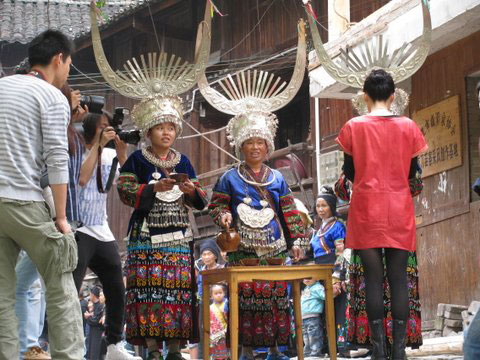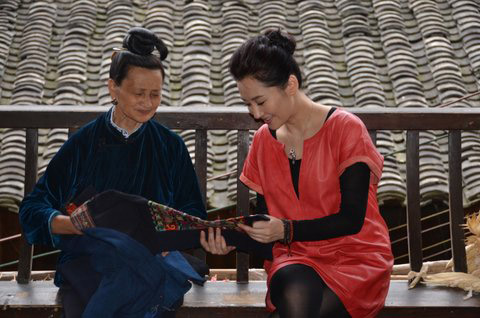The Miao and the moviestar
Hanging with the minorities – by Sasha Draggeim
After my performance on the glittery and crowded stage of Hunan TV, I decided to go to an area untouched by maddening economic growth, heavy pollution and large-scale performances (or so I thought). Guizhou province in China’s relatively undeveloped southwest seemed perfect, and the work was meaningful – visiting the countryside to help set up programs to improve living conditions for villagers, many of whom belong to ethnic minority groups.
The first few weeks with my colleagues were spent languishing in our rooms at Guizhou Normal University and exploring local noodle shops. Our enthusiasm was beginning to fade when we got a phone call from our supervisor. The next morning, she said, we were to depart for Jidao, a small Miao ethnic community, on our first official excursion. Finally, it was happening!
There was one more last-minute detail. We were to be joined by the actress Xu Qing, known for her roles in movies such as the blockbuster The Founding of a Republic. Along with her photographer. And her manager. And her make-up artist and bodyguards.
On the way, we made a stop in Leishan, a small town with brand-new architecture and impeccable streets. As evening fell, we realised something was wrong. There were no people, not a soul in sight. Yet the whole area was ablaze with thousands of lights, like a European town at Christmas. We were told that this ghost town was recently constructed by the local government – but locals, apparently, weren’t too keen on moving in.

As our bus rolled along a newly paved highway, trailing Xu Qing’s jeep, I sleepily contemplated our adventures to come, already infected by the mellow southern atmosphere. We were to organise embroidery contests, encouraging village women to continue centuries-old traditions. We were to meet the good-natured Miao people, establishing welcoming conditions for well-meaning, respectful Han tourists. We were to see a China undistorted by the cruel machine of economic development.
It was in the company of our glamorous companion that we arrived in Jidao, where we were welcomed by a group of older men playing the lusheng, a traditional reed pipe instrument, and villagers lined up to greet us. We trailed behind Xu Qing and her entourage, swept under a wave of admiration and reverence amid the click-click-click of the cameras. Everyone’s eyes were fixed on the Han woman in the shiny pink dress who floated before them.

Like an overfed snake, the crowd slowly crawled towards the home of Grandmother Yang, a lively 90-year-old embroidery master. Xu Qing’s photographers went to work as we idled about on the terrace. When the session was over, the crowd flowed out towards the street again. I squeezed myself back to avoid the good-bye bowl of rice wine brought out for Xu Qing, but Grandmother Yang zeroed in on the foreigner, and, ignoring my protests, poured the wine into my mouth in full view of the cameras.
After a full-day photo shoot for the Chinese edition of Marie Claire, Xu Qing was finally whisked away. Left alone, we walked around the crooked cobblestone streets before returning, exhausted, to bed.

The following morning we ate breakfast with Chen Qin, a local whose home/hotel we were staying at. She explained that most working-age people had moved out of the village, but that Jidao was in good shape thanks to tourism. Every day, swarms of German, Swedish, and Han Chinese tourists enjoyed the standard greeting menu of reed pipes, rice wine and abridged Miao songs.
Chen Qin’s seven year old daughter, whom I had seen at the festivities, was sitting next to us, keeping a watchful eye on her baby cousin in a motherly fashion. We sat for a moment in silence, gazing through the open windows at the river flowing slowly in the distance. The hubbub of the celebrity visit had finally died down, and village life had returned to its usual rhythms.
“What do you want to do when you grow up?” we asked her. She would certainly go to school, where her father works as a teacher, and then leave the village we thought. The girl looked up and said, “I want to take good care of my mom and dad.” We left the next day.
We went on several other trips to ethnic villages, replete with endless banquets, meetings with local officials and discussions of failed tourist attractions. In the smoky haze of the banquet halls, the memory of Chen Qin’s daughter would resurface to remind me that this may not be the authenticity I had longed for, but it is still worthwhile.

•
Sasha Draggeim is a PhD student in Chinese pedagogy at Ohio State University

















